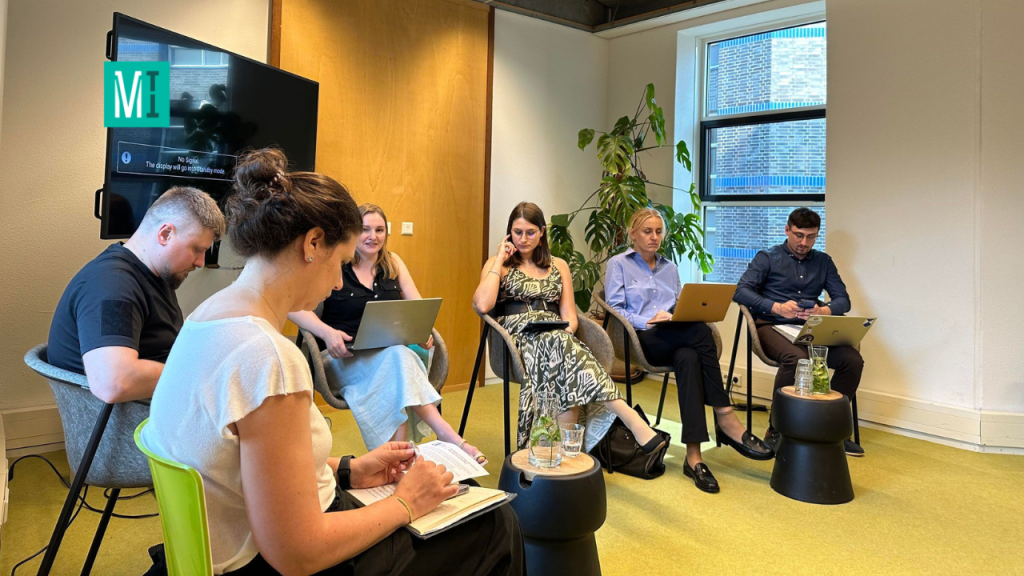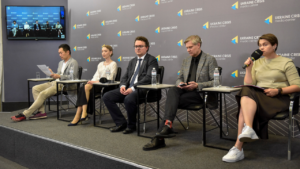Russian trials of Ukrainian prisoners from the perspective of international law: The MIHR held an expert discussion in The Hague

The Media Initiative for Human Rights organized a roundtable discussion, “Deprivation of the right to a fair trial in international criminal law.” It was attended by Andriy Kostin, Prosecutor General of Ukraine, Olha Reshetylova, Head of the Media Initiative for Human Rights, Prosecutor Andriy Leshchenko from the Office of the Prosecutor General, Maksym Tymochko, Officer of the International Law Department of the Ministry of Defense of Ukraine, Dileta Marchese, Doctor of International Humanitarian and Criminal Law, and Iryna Marchuk, Associate Professor of International and Criminal Law at the University of Copenhagen. The event was moderated by Nadiya Volkova, founder and director of the Ukrainian Legal Advisory Group.
Before the discussion began, the Media Initiative for Human Rights (MIHR) showed a video that the team had shot specifically for the event in The Hague to immerse the audience in the context of the problem. For the video, MIHR journalists interviewed people who had encountered the Russian judicial system.
The discussion was opened by Prosecutor General Andriy Kostin, who emphasized that Russia is grossly violating international humanitarian law concerning the regime of the occupied territories. He also emphasized the violation by Russia of the legal immunity of the Ukrainian military, which, following the Geneva Conventions, cannot be held accountable for participation in military operations. Kostin mentioned the examples of many Azov and Aidar fighters who are accused of participating in “terrorist organizations” or “overthrowing the government” in the occupied territories. According to him, even the legal logic of such accusations is absent since Russia included Azov in the list of terrorist organizations only three months after the Azov members against whom criminal cases are being fabricated were captured. In other words, they are being tried for something not criminalized before. This approach contradicts the fundamentals of law.

Andriy Kostin, Prosecutor General of Ukraine, participated in the event online. Photo: Prosecutor General’s Office of Ukraine
According to Prosecutor General Andriy Kostin, the situation with Ukrainian civilians, who are partly kept in detention by Russia without explanation, is no less regrettable. In the case of criminal trials against them in the occupied territories, Ukrainian criminal law should be applied, not the legislation of the occupying country, not to mention the transfer of civilian Ukrainians from the occupied territories to Russia, which is strictly prohibited by international law.
“We must ensure respect for the right to a fair trial in times of war,” Kostin said. “When a violation of this right occurs in an armed conflict, it can be qualified as a war crime. There is no doubt that among the 130,000 war crimes committed by Russia that have already been recorded, we are investigating cases of deprivation of the right to a fair trial for Ukrainian prisoners of war and civilian detainees.”
According to the Prosecutor General, his office has opened three criminal cases against judges working on behalf of Russia in the occupied territories so far. However, law enforcement is aware of many more cases of human rights violations, including the right to a fair trial, than they are aware of. Therefore, Kostin thanked the civil society organizations that monitor these cases and provide information support to the prosecutor’s office and other authorities.
“It is tough to monitor trials in the Russian Federation physically,” emphasized Olha Reshetylova, Head of the Media Initiative for Human Rights, “Those who research politically motivated courts are under constant risk of arrest or interrogation by the Russian Federal Security Service. Nevertheless, the MIHR, together with its partners, has already identified 204 verdicts of Russian and occupation courts against civilian detainees and Ukrainian POWs. However, we believe there may be much more, as it is difficult to count them, and hundreds of similar cases are currently being considered in courts.”

Olha Reshetylova (left), head of the Media Initiative for Human Rights. Photo: MIHR
According to Reshetylova, analyzing the trials against Ukrainians captured by Russia, the MIHR concluded that they were all part of a deliberate policy of the Russian state. The Russian authorities use their judicial system to persecute Ukrainians, propagandize, and justify their crimes. The Head of the MIHR stated that there are especially many trials of Mariupol defenders, whom Russia accuses of crimes against civilians committed by the Russian military itself.
“We need to explain to the international community that this has nothing to do with justice. And the latest decision of the European Court of Human Rights also shows this”.
“It says that the courts established by Russia in the occupied Crimea are illegal. So we can draw parallels with other occupied territories. What human rights activists have been saying for many years has been confirmed by the European Court of Human Rights. However, the position of the MIHR is that all this should be considered in the context of Russia’s overall state policy. That is, the deprivation of the right to a fair trial cannot be separated from other crimes committed by Russia,” added Olha Reshetylova.
On the day of the roundtable, two international courts issued critical decisions concerning the Russian-Ukrainian war in general and the deprivation of the right to a fair trial. Thus, the European Court of Human Rights recognized the Russian leadership responsible for systematic human rights violations in the temporarily occupied Crimea, as stated in the ECHR judgment in the interstate case “Ukraine against Russia (concerning Crimea).” One of the numerous human rights violations recognized is the extension of the legislation of the Russian Federation to the territory of the Autonomous Republic of Crimea, as a result of which the courts operating on the peninsula cannot be considered as established by law. The International Criminal Court issued arrest warrants for former Russian Defense Minister Sergei Shoigu and Chief of the General Staff of the Russian Armed Forces Valery Gerasimov on suspicion of committing war crimes in Ukraine.
Guilty without guilt
A Prosecutor General’s Office representative, Andriy Leshchenko, focused on the inconsistencies in the Russian prosecutor’s office’s charges against the Ukrainian military.
“We have many cases where officers of the Ukrainian Armed Forces are accused of war crimes, including shelling of civilian objects, although at the time these servicemen could not physically commit such a crime,” Leshchenko said. “For example, the accused serviceman could have been elsewhere or on vacation. However, this does not bother the Russians. They are trying to use every opportunity to discredit both our Armed Forces and our country.”

Andriy Leshchenko, a Prosecutor General’s Office representative
Commenting on the deprivation of the right to a fair trial as a war crime, Dileta Marchese, Doctor of International Humanitarian and Criminal Law, focused on the historical retrospective of this issue. In particular, she commented on the difference between denying a fair trial as a war crime and violating Article 6 of the European Convention on Human Rights. According to Marchese, all violations that occur during an armed conflict must be viewed comprehensively, as often different types of war crimes, including violations of the right to a fair trial, are interrelated and are linked in a system of crimes.
“States and non-state groups often use unfair trials as a formidable weapon in war,” the lawyer says, “They deprive individuals of judicial guarantees or deny them a trial altogether. However, such violations are often part of a much broader system of crimes, such as torture and enforced disappearances.”

Dileta Marchese, Doctor of International Humanitarian and Criminal Law
Iryna Marchuk, associate professor of international and criminal law at the University of Copenhagen, is also convinced that Russian trials against Ukrainians have standard systemic features that can be qualified as an international crime. She says that such trials are a reflection of Russia’s policy of persecuting ethnic Ukrainians and Crimean Tatars, particularly in occupied Crimea.
“The right to a fair trial is fundamental. Unfortunately, it is being violated in the occupied parts of Ukraine in various forms. This crime was first committed in Crimea, and after that, it spread to the rest of the occupied territories,” Maruchk notes. “Since the occupation of Crimea, judges have completely ignored any requests from the defense lawyers of the “suspects,” and the prosecution has been based partly on anonymous testimony. There were clear indicators that the courts were not independent even then. Over time, the situation has deteriorated and spread to the newly occupied territories.”

Iryna Marchuk, associate professor of international and criminal law at the University of Copenhagen
In his part, Maksym Tymochko, an officer of the International Law Department of the Ministry of Defense of Ukraine, focused on how justice should be administered in the occupation. He emphasized that a court operating in the occupied territory by international law is not a priori illegal. Moreover, international humanitarian law obliges the occupying power to ensure fair justice in the territories under its control. For example, the 1949 Geneva Convention relative to the Protection of Civilian Persons pays considerable attention to establishing the rule of law and the judicial system in the occupied territory.
“In practice, this means that Russia should leave in force the criminal law and judicial system of Ukraine in the occupied territories. However, it deliberately ignores the laws and customs of war and does not recognize its responsibilities as an occupying power. Instead, it has annexed the occupied territories, which further aggravates its responsibility,” says Maksym Tymochko.

Maksym Tymochko, an officer of the International Law Department of the Ministry of Defense of Ukraine
Summarizing the event’s results, Olha Reshetylova, Head of the MIHR, noted:
“Until recently, deprivation of the right to a fair trial was considered a rather exotic crime in international criminal law. Of course, with this event in The Hague, we do not yet aim to have the International Criminal Court start investigating this crime today. But it is essential to draw the international community’s attention to this now. We need to show that Russia is creating a parallel legal reality. And it has nothing to do with justice.”
Ihor Vyshnevskii, the MIHR`s journalist






